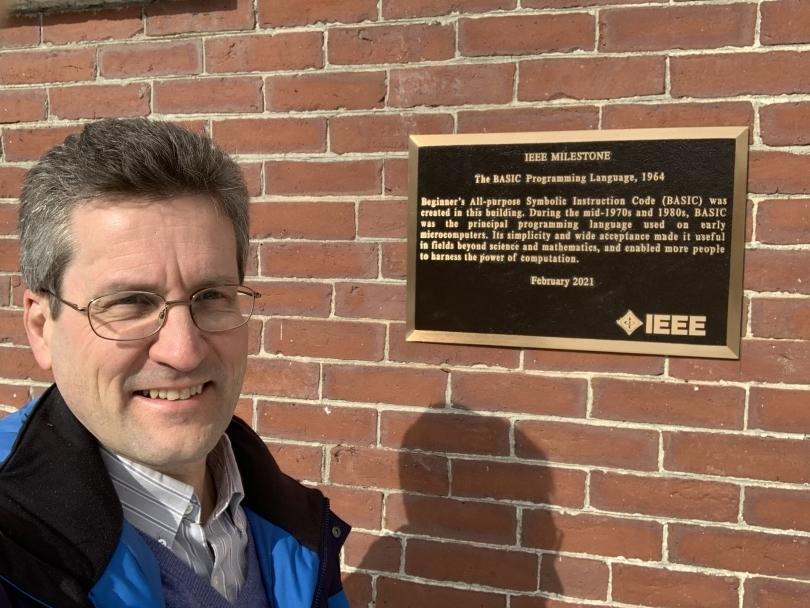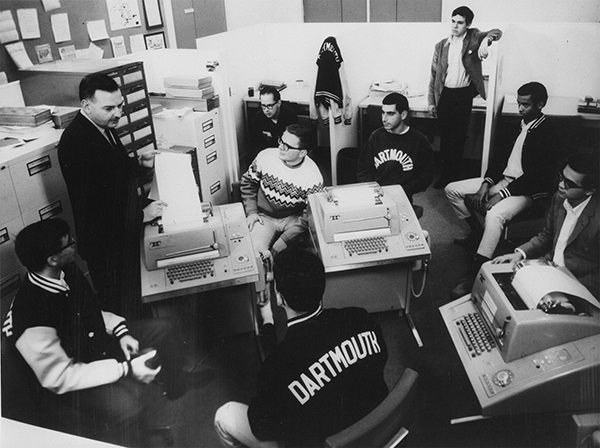Celebrating the Birth of BASIC—and Beyond
Dartmouth receives a prestigious honor as the place that took computing in a whole new direction

The date was May 1, 1964. The time: 4:00 a.m. Eastern. Professor of Mathematics John Kemeny and a student programmer ran two programs simultaneously on neighboring terminals in the basement of College Hall, launching the new BASIC programming language. BASIC was invented by Kemeny and Professor of Mathematics Thomas Kurtz.
That moment revolutionized computing for Dartmouth and the world, starting a whole new era of personal, accessible computing. Recently, Dartmouth received significant recognition for this historic achievement. The Institute of Electrical and Electronics Engineers (IEEE), an international organization dedicated to fostering technological innovation, research, and education, dedicated an IEEE Milestone marker at Collis Center to commemorate the creation of BASIC. Collis Center was originally College Hall where BASIC was launched.
IEEE’s Milestone program marks historic places for human innovation from around the world. Places honored include Thomas Edison’s lab in Menlo Park, New Jersey, where he invented the light bulb and phonograph, and the hilltop outside Bologna, Italy where Guglielmo Marconi sent the first transatlantic radio transmission.
“For BASIC to be included among these remarkable places is a huge honor,” says David Kotz, the Pat and John Rosenwald Professor of Computer Science. “It reminds us of the enormous power that BASIC had and how ahead of its time it was.”

The invention of BASIC developed from Kemeny’s vision that computers should be a part of everyday life and everyone at Dartmouth should have access to a computer. With the creation of BASIC, computing was free to everyone on campus.
“When you showed up to Dartmouth as a student, you had an account on the computer,” says Kotz. “That was extremely unusual for that time. At other universities, you had to be a well-known researcher and pay to gain an account and access a computer.” By 1967, approximately 2,000 Dartmouth students had learned to create their own programs.
LEARN MORE ABOUT THE HISTORY OF BASIC
Six decades after the creation of BASIC, Dartmouth continues to be a hotbed of computer science innovation. Looking ahead, Kotz sees the Department of Computer Science collaborating with departments and centers across Dartmouth to develop solutions to some of our world’s greatest issues. The new Center for Engineering and Computer Science (CECS), on track to open in the fall of 2021, will be a vibrant tech hub housing an enhanced Department of Computer Science, the Magnuson Center for Entrepreneurship, and a significant expansion of Thayer School of Engineering under one roof—and inviting faculty and students from all disciplines to the West End of campus.
Computer science and engineering are two of the fastest growing majors at Dartmouth—the number of computer science majors has more than quadrupled during the past decade. The two programs are adding more than 40 faculty members in the years ahead.
All this growth will spark a “flood of new collaboration between computer science, engineering, business, medicine, and the arts and sciences,” says Kotz. It will also prepare undergraduates to become leaders in applying computer science methodologies to big problems.
“Our department is very human-centered. It’s all about how technology crosses with society,” says Kotz. “We have faculty using robots to study climate change and algae in New Hampshire lakes. Others work with government and economics on the impact of fake media and bots on elections. We support and enable a lot of research across diverse disciplines.”
“In the broad picture, we are continuing Kemeny’s vision from the 1960s,” says Kotz. “We’re opening up so many exciting opportunities for learning and research, for our undergraduates, graduate students, and faculty—to develop bold ideas and help build a safer, better world.”
Learn more about the history and development of BASIC and personal computing.
Support the New Center for Engineering and Computer Science